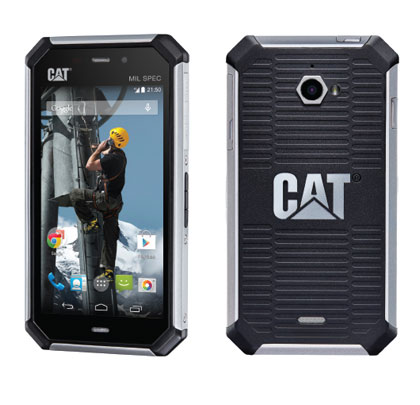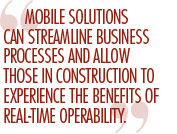In the world of construction, many companies, including Kiewit, Bechtel, KBR, and The Turner Corporation, are making employee perks an important part of their workforce retention and benefits plans. These companies are turning to strategies, such as wellness initiatives, start-up like offices, employee stock options, and custom technology solutions, to woo job candidates from top college graduates to industry veterans.
According to a recent Forrester report, an approach called “agile workforce enablement” encourages employers to rethink how they deliver technology to the people who drive their business. In order to create a habitat of technology engagement and enablement for a workforce, it is critical to arm employees with on-the-job tools that streamline business processes, help people better collaborate, and improve productivity.
The study found that 75 percent of technology managers see the importance of mobile; thus expanding their mobile strategy internally and externally. The study also found that 73 percent of employees are happy with the technology they have at home, while just 59 percent are happy with the technology they are given at work, which shows employers need to rethink how they support employees and how this support will affect operations.

Rugged smartphones, like Cat Phones, are built specifically for outdoor workers who are exposed to high temperatures, water, dust, and rough terrains on a daily basis.
TECHNOLOGY’S ROLE ON THE JOB
Contracting firms worldwide rely on employees who are not chained to desks or main offices and can benefit from custom mobile solutions. General laborers, construction workers, foremen, and supervisors alike can streamline business processes and experience the benefits of real-time operability provided by mobile solutions.
For example, general contractors are constantly required to undergo site inspections. Foregoing paper forms and switching to mobile phones or tablets can greatly improve efficiency and accuracy when collecting on-site data. With a mobile device at his or her disposal, the construction worker is able to log findings from a daily task, such as a site inspection, and deliver information on-site or off-site to a remote office location.
This logging of field events via mobile rather than manually inspecting potential problem areas enables project managers to access data quickly and efficiently in order to analyze and address emergent problems immediately. In fact, a recent study from Aberdeen Group found that 82 percent of field service organizations identified mobility as a strategic initiative to empower workers with real-time intelligence to make decisions and resolve issues to better serve the customer.
In another example of mobile solutions improving business processes for the construction industry, general contractors are faced with the possibility of an emergency evacuation of the construction site or accidental injury that would require instantaneous communication. With GPS-enabled smartphones and tablets that allow for geolocation, supervisors and managers can address issues more quickly—not only saving time and money but also lives.

RUGGED TECHNOLOGY FOR EMPLOYEE RETENTION
Beyond standard mobile devices, software, and apps, industry leaders are beginning to recognize the importance of custom solutions designed specifically for the construction industry. General contractors demand technology that provides both high-performance and protection from the elements as they spend many of their days outdoors and in challenging environments.
For example, rugged smartphones like Cat Phones and tablets like the Panasonic Toughpad are built specifically for outdoor workers who are exposed to high temperatures, water, dust, and rough terrains on a daily basis. These devices are waterproof, dustproof, and can withstand drops on concrete, bumps and scrapes that are inevitable on the job when handling heavy machinery or construction tools. They are built to remain undamaged in the most rugged environments and are enabled with full functionality even in the most trying working conditions. Apps like Work Order Assigner, Construction Manager, and PlanGrid are essential tools for people in the construction industry to optimize workflow and promote data accuracy.
Leading contracting firms are quickly realizing that mobility tops the list of expectations of today’s employees. In order to stay connected and get the job done efficiently, employees expect high-speed mobile access and smartphones, tablets, and apps designed for their roles. By providing employees with anytime, anywhere access to timely information on the job, and custom hardware and software, employers can win, serve, and retain a truly engaged and productive workforce. ■
About The Author: Theresa Cangialosi is the general manager and vice president of North America at Bullitt Group. Previously, Cangialosi was director of strategic accounts for Kyocera where she successfully grew the business and drove the company’s relationship with Verizon Wireless. Prior to that, she spent 2 years at Huawei as director of sales and 9 years at LG Electronics where she worked in the U.S. handset division.
_________________________________________________________________________
Modern Contractor Solutions, May 2015
Did you enjoy this article?
Subscribe to the FREE Digital Edition of Modern Contractor Solutions magazine.

Technology for the Smarter Construction Workforce of Tomorrow


